
Once there was a little girl who was afraid for five years.
She grew up under Nazi occupation in Norway. The girl is my mother and here’s her story.
Mom grew up on a timber farm named Skrede, the Norwegian word for avalanche. Snow rumbled down the steep rocky mountainside in winter, hence the name. The lake at the bottom of the mountain was as clear as a mirror in summer. In winter it froze and she could skate or ski across.
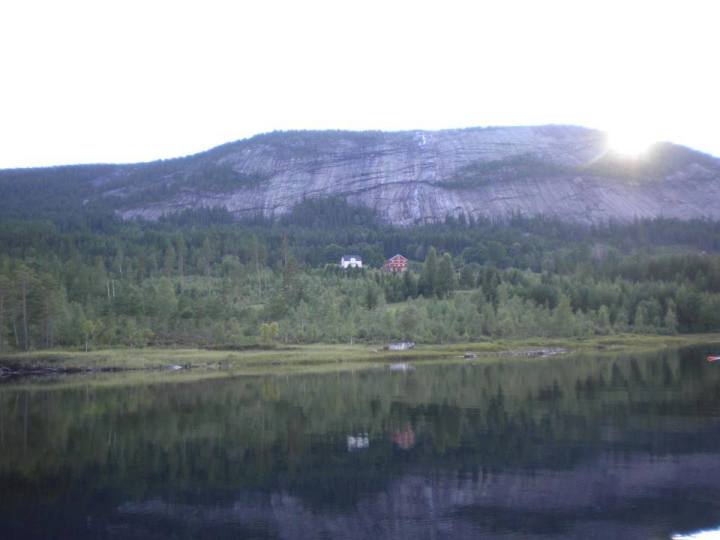
Skrede was a huge farm, almost totally self-sustaining. Potatoes were the staple crop, along with many other vegetable crops. The land produced three types of fruit trees. They also grew gooseberries, currents, strawberries, raspberries and lingonberries. Wild blueberry bushes grew everywhere. And then there were the cloudberries – which just appeared, tucked away in the grass. They were precious, like a secret you wanted to guard.
In the Skrede barn you’d find horses, cows, sheep, chickens, and a pig. Also a sheep dog for herding and a barn cat. Roaming in the woods were moose, deer, hare, grouse and occasionally, foxes.
In summer they fished and swam in the lake. And in the fall the neighbors all gathered together for the big event, the moose hunt.
Skrede’s barn was big, bigger than the house, neither of which had electricity. Oil lamps provided light. The bathroom was adjacent to the barn in an unheated outhouse.
Wood-fed stoves heated every room in the home. On many winter mornings mom woke up to an ice-cold bedroom, the stove’s fire long gone out and the water in her pitcher frozen.
The house’s underground floor had a large room for crop storage, a simple kitchen, a room for washing clothes and a cement tub for bathing.
Chores ruled the day from sun-up to sun-down. Milking, tending animals, fueling stoves, harvesting. It was endless. The children were taught about producing and harvesting. They learned everything necessary to run a farm. They were expected to take care of themselves from an early age, to be independent of others.
Mom remembers the hard work that never stopped. Some of her favorite chores were to go deep into the forest, gather the sheep from their grazing and lead them back to the barn. And every spring she assisted when the ewes gave birth. If there were any orphaned baby lambs, mom nursed them and they thought she was their mommy.
Only two people in their small town had cars, the doctor and the minister. Mom’s family traveled by horse and buggy in summer; horse and sleigh in winter.
So that, friends, was the place where Mom grew up, the 2nd daughter of her parents. In the photo you’ll see her on the right with her older sister, before war broke out.
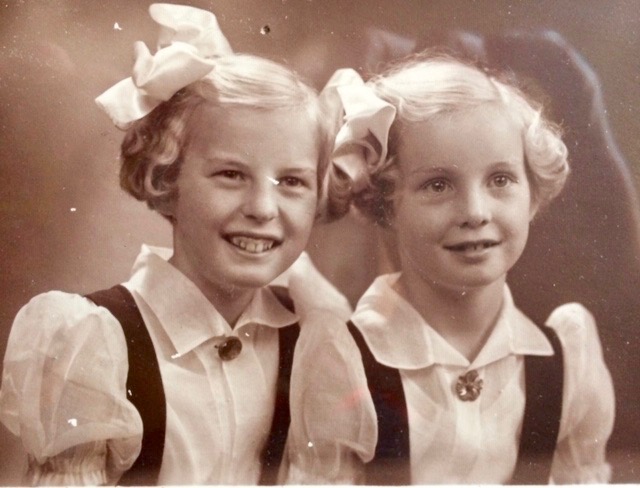
Quite a while ago Mom started talking about her experiences of World War 2. They were so compelling I decided to write them down and I’ve been collecting them for the past 15 years or so. Now I’d like to pass them on to you.
< O C C U P A T I O N >
In 1940 on April 9 my grandfather was listening to the radio in the farmhouse. He hurried to the kitchen that morning and sternly told the family, “We’re at war. We’re at war!”
Mom was 5 years old. So little. Her father’s words were scary. To her, war meant people fighting each other – guns and shooting and killing. How could she process such horrible news at her age? There was no loving lap to run to for comfort or reassurance. Her parents knew nothing about giving those things. And they were now very preoccupied. So mom had to deal with her little girl fears alone.
Before occupation Norway had been a neutral nation with little military resources. It only took 24 hours for the entire country to be taken captive by the Germans. The surprise attack was totally unexpected. It caused confusion and psychological shock throughout the country. Everyone’s senses were heightened to the utmost, screwed tight.
Mom remembered, “Everything changed overnight. Nothing was normal or right, it was just frightening,”
One of the first things her parents did was to hide away some real coffee, hide their Norwegian flag and hide my grandmother’s beautiful Norwegian national costume.
They wouldn’t see their flag for the next 5 years.
Soldiers in green uniforms started moving throughout the country, speaking German, carrying guns. Commerce essentially stopped. Luxury items like coffee, chocolate, sugar and gasoline were suddenly gone. The fuel that replaced gasoline smelled bad. Her mother attempted to make coffee with pine tree bark. Tobacco was also gone. My grandfather tried to grow his own, drying the large leaves in the attic. Sugar was replaced with a poor substitute.
Norwegians were banned from moving about freely or showing patriotism of any kind. All radios and weapons were confiscated. Listening to illegal radio stations was punishable by death. But the resistance was strong in Norway. My grandfather and his farmhand hid a gun and a radio deep in the woods. And Mom’s older sister was sent into the forest to hide some ammunition. It was used for hunting and the family didn’t want to lose it.
I asked mom if her father was involved in the resistance and she replied he was, in small ways. Of course he couldn’t talk about it, especially around children. But she noticed he would periodically go out into the woods to meet with relatives and other local men.
One day the Allies dropped supplies around the villages near Skrede, which, of course, made the Germans upset. So they raided the area, determined to find out if the local men knew anything about it (which they probably did). The Nazis arrested all of the men and teenage boys, including my grandfather. They were taken several hours away and questioned near Oslo. One teen, my mother’s youngest uncle, upon arrest blurted, “Oh, who will help my mother with all the chores on the farm?” Because of his emotional outburst the Germans suspected him of something sinister. They sent him to Grini, the large prison camp near Oslo (photo below). His imprisonment lasted the entire war.
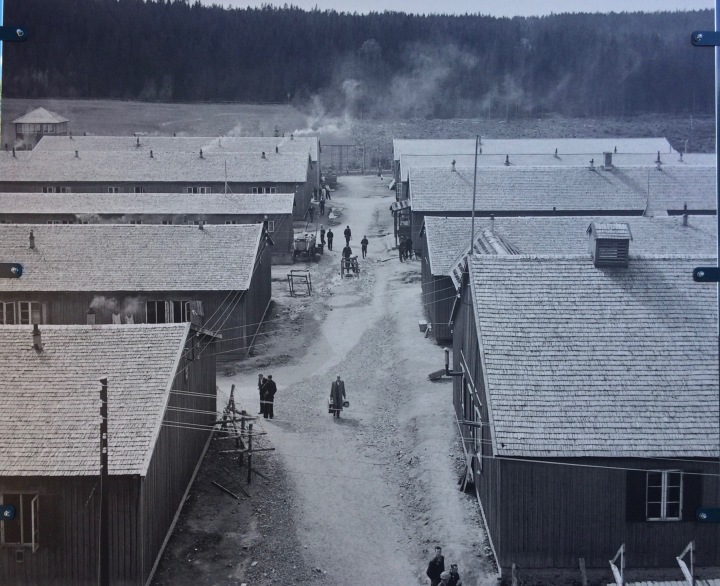
As the local men were being arrested my grandfather was taken into custody at the Skrede farmhouse. He was ordered to leave immediately without a change of clothes or anything. Thankfully he was wearing thick wool socks and wooden clogs on his feet. He was sent to Kristiansand, a labor camp near the southern coast. He was held for several months and released.
The BBC news agency was one of the most significant sources of information for those living under Nazi rule. Their radio bulletins broadcasted British attempts to vanquish the enemy. Their goal: tell the unvarnished truth. They decided that if they could openly admit their defeat, it would be thought they were extremely confident, convinced of eventual victory over Nazi Germany. They began their broadcasts with the hard news, finishing with any good news to report. By 1943 the BBC was transmitting their bulletins into 54 languages.
News, as you can imagine, was a magnet for those under Nazi oppression. And my grandfather was listening. He and his farmhand made it a practice to go out into the woods every day at 4pm to listen to the Norwegian BBC translation on their hidden radio. They would come home and my mother would hear her parents whispering. All adults seemed to be whispering because no one knew who to trust. She would hear them whisper “….the Allies….” They were always talking about the Allies. And mom knew who they were, that their hopes were firmly rooted in the Brits and the Americans.
One day a group of German soldiers came to the Skrede farmhouse to obtain food. Mom, in the kitchen, hid herself in the apron of the live-in maid. But, still feeling afraid, she ran up to her bedroom and hid underneath her bed.
During wartime, it was discovered that another baby was on the way. Another daughter. After her birth the family wanted her to be baptized. However, one previous Sunday the local minister had said something anti-Nazi from his pulpit and was told by the authorities to leave. That left their local church with no leader, so the new baby was baptized in the Skrede farmhouse by an uncle, a Lutheran minister.
School continued, war or no war. Mom walked or skied to the tiny one-room schoolhouse on the other side of the lake, often leaving home when it was still dark outside. When the lake was frozen and covered with snow it provided a short-cut on skis.
For some time her school had a Nazi fellow as their teacher. The Germans were attempting to spread their Nazi ideologies throughout the country. All mom’s classmates decided not to study very hard. In fact, the older students played pranks on the teacher. He wasn’t amused.
One day, on her way to school, she saw a German soldier coming towards her on the road. She quietly hid in the woods on the other side. He passed by.
And then there was this memory. Mom was outside, next to the house and saw a soldier sneaking around, hiding under the current bushes. She could tell he was German from his green uniform. She quietly watched him. She said, “I didn’t tell my parents, didn’t tell anyone I saw him. To me he seemed all alone and as scared as I was. I had no idea why he was there, if he had run away from the other soldiers or if he was looking around. But I didn’t tell anybody.” She knew if she told her parents there would be a big ruckus so she kept it to herself. He was never seen again.
One morning the family woke up to find someone had broken a window leading into the underground cellar. Mom’s mother had baked several loaves of bread the day before. Quite a bit of it was gone, along with homemade canned food. They never discovered who the culprits were.
During the war nothing was wasted. But it was a challenge to clothe the now 3 daughters in their home, especially in winter when boots were needed So things were handed down. A lady from across the lake would come stay with them and sew clothes for the family when new ones were needed.

Mom often expressed what it felt like to live without freedom. Nobody, child or adult, escaped the feeling of pervasive powerlessness. People in the cities were having a harder time with food shortages, blackout curtains and ration coupons. Home-grown produce from Skrede was sent to relatives in the cities to help them manage. Food wasn’t a problem for her family on Skrede but the emotional and mental toll went deep.
Skrede is found in the interior countryside of Norway, very remote. Few German planes flew overhead and the region saw little bombing. The heaviest bombing in Norway was way north, near the Russian border.
Speaking of the Russians, the Germans captured many of them in Norway and forced them to labor for them as prisoners of war. Near my maternal grandmother’s home, some of the captured Russians were working, hungry and sick. Mom’s relatives decided to help those soldiers by giving them food and medicine. They were so grateful but didn’t know how to repay the kindness. They found pieces of wood in the forest which they used to carve beautiful bird designs and they offered the carvings to the family in gratitude. The intricate birds are still there today. (see photo in postscript)
As Mom talks about the war, there are two days she mentions the most, in fact, she mentions them every time: The day the war began and the blessed day it ended.
< L I B E R A T I O N >
In 1945 on May 8 the Germans capitulated, driven out by the Allies.
Overnight all the Germans seemingly vanished. Mom speaks of this day, struggling to find the right words, “You have no idea what the day of liberation was like. Oh my goodness, oh gosh, there’s no way you can imagine!”
On that day her older sister was tending sheep below Skrede. Suddenly she saw Norwegian flags being hoisted all around the village. It could only mean one thing! She ran home to tell everyone but the good news had already been communicated via telephone.
My mom, now age 10, watched her mother put on her beautiful national costume, then take their Norwegian flag to the pole in the farmyard. She raised it, tears of joy streaming down her face. My grandmother was not a person who openly expressed emotion but on that day she couldn’t hold it in.
As they looked around the lake they saw flags being raised on other flagpoles.
That was a day no one would ever forget.
Remember mom’s uncle who was imprisoned for worrying about his mother? After years of imprisonment he was released. But the conditions in his concentration camp were very unhealthy and he returned home thin and sick, needing to be hospitalized for quite a while.
As the war ended things slowly returned to normal. Mom recalled the smell of real gasoline after the war. When she smelled it, it made her think of freedom. And when she received her first post- war bar of chocolate she took it to the barn, broke some off and shared it with Blakken the horse, because she figured he’d missed chocolate too.
‡ ‡ ‡ ‡ ‡

— P O S T S C R I P T —
Mom’s uncle who was hospitalized after his release had a devoted nurse. So devoted, in fact, they fell deeply in love and eventually married and that sweet nurse became mom’s aunt.
It turns out the German attack in 1940 had been aided by a young Norwegian who had attended the Norwegian Military Academy and was from the same county as my family. It’s almost inconceivable that he helped the Germans plan an attack on his own homeland. Mom said his act was such a deceit and betrayal of Norway. After the war he was so reviled that he was executed by the Norwegian government.
Here’s some information I found on liberation day: The Norwegian people took to the streets to celebrate their freedom. Soldiers and prisoners of war came home in the days after May 8, and the rejoicing was great. The blackout curtains could be burned and the Norwegian flag could once again wave freely. For the vast majority the celebration was a joyful time, but many people were missing and some never got their loved ones home. The celebration that began on May 8 lasted for a whole month and reached its peak when King Haakon returned home to Oslo June 7 after five years in England.
Below are the beautiful wooden birds carved by the Russian prisoners.
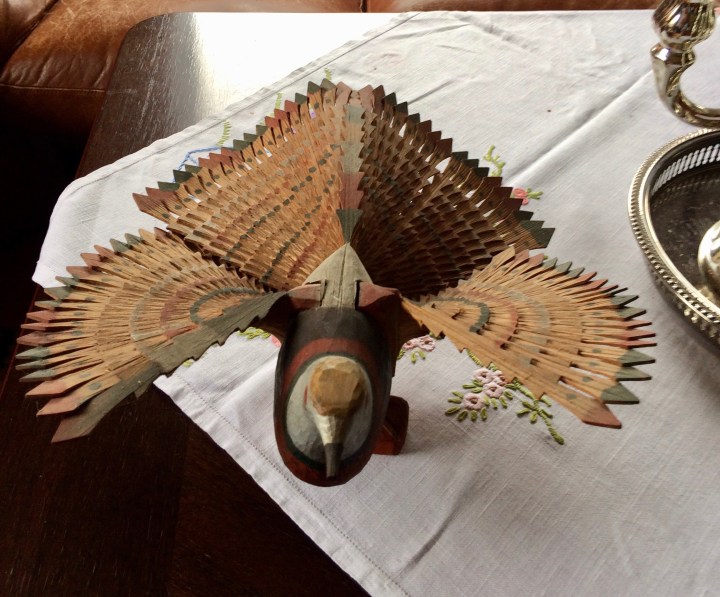
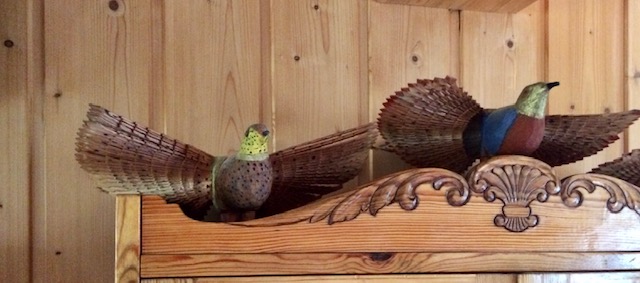
I mentioned my grandfather wearing woolen socks during his captivity. I believe they kept his feet warm because Norwegian wool is very strong. My mom passed this handmade wool sweater to me several years ago. Her mom knitted it for her and, let me tell you, it’s old but still in fine shape and it’s like wearing the warmest blanket or coat out there.
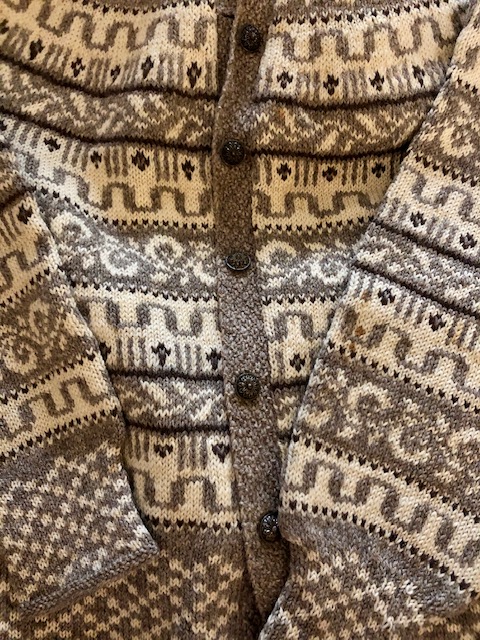
My grandmother was so artistic. Scattered throughout this post are samples of her paintings (Rosemaling), weaving along with her knitting.
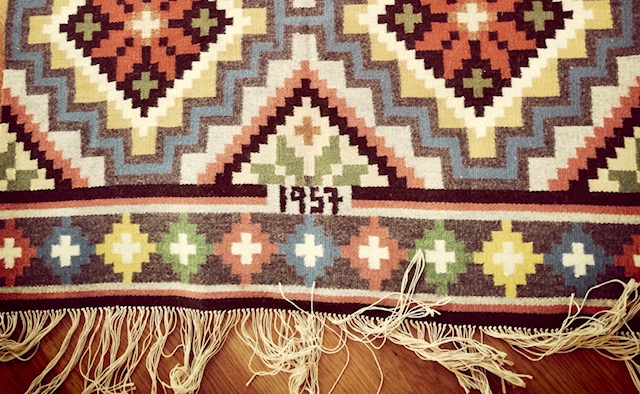
I want to thank my mom for sharing her memories with me. Also my sister, my Norwegian cousins & my aunt for helping me fill in some of the gaps in this story.
TUSEN TAKK!
Great storytelling Liz! Your words are so clear, I felt as if I were in the story with your Mom.
LikeLiked by 1 person
thank you!!
LikeLike
Thanks for sharing these important memories of your mother’s life. I love reading about love of country and freedom. So glad you shared and honored your mom with her story!
LikeLiked by 1 person
I’m so glad you enjoyed it Lynne.
LikeLike
Oh my what an incredible story. Thank you for sharing. Knowing your Mom has been an unbelievable joy and to know what she survived is beyond belief.
LikeLiked by 1 person
Thank you Helen, it was such a privilege to write it.
LikeLike
Wonderful story-telling. Such a hard time for them. I sure it left marks on them all.
Jan
LikeLike